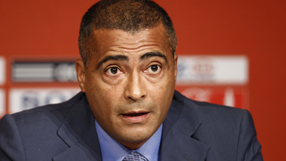
The best features, fun and footballing quizzes, straight to your inbox every week.
You are now subscribed
Your newsletter sign-up was successful
Want to add more newsletters?

Five times a week
FourFourTwo Daily
Fantastic football content straight to your inbox! From the latest transfer news, quizzes, videos, features and interviews with the biggest names in the game, plus lots more.

Once a week
...And it’s LIVE!
Sign up to our FREE live football newsletter, tracking all of the biggest games available to watch on the device of your choice. Never miss a kick-off!
Join the club
Get full access to premium articles, exclusive features and a growing list of member rewards.
The former World Cup striker, now a member of parliament, failed this year in an attempt to bring Brazilian Football Confederation (CBF) president Teixeira before parliament to answer allegations of corruption.
Romario, however, believes this week's police decision to open an investigation into Teixeira, who is also head of the World Cup organising committee, could be viewed as a green light for improving tournament preparations.
"This is not about a full-frontal attack, it's about saying that some [people] sometimes don't have the courage to say... the pure truth, the reality," Romario told Reuters in an interview at his Barra da Tijuca apartment overlooking the sea.
"Someone must at least make a stand," added the 45-year-old who spearheaded the attack when Brazil won the fourth of their record five World Cup titles in 1994 and now wants a leading role off the pitch.
Romario said he had tried to arrange a meeting with President Dilma Rousseff to talk about the World Cup but it had proved impossible.
He believes the government has been weak in bowing to the demands of FIFA and in not turning up the heat on Teixeira who has led Brazilian football since 1989.
The striker added Teixeira had impeded the progress of Brazil's World Cup preparations by failing to answer criticism.
The best features, fun and footballing quizzes, straight to your inbox every week.
"The government must put pressure [on him]. Things are not as he says, he doesn't rule the country, he doesn't govern football," said Romario.
"The CBF is the top body but football doesn't have an owner, it belongs to the people," he added. "The World Cup is Brazil's of the Brazilian people.
"People have to be grateful that Ricardo Teixeira brought the World Cup to Brazil. Congratulations, we thank you. Full stop. From here on it's Brazil's."
On Tuesday the police and the federal prosecutor's office announced Teixeira would be investigated on suspicion of illegal transfer of funds into the country and money laundering.
CBF spokesman Rodrigo Paiva told Reuters that neither his organisation nor Teixeira had any comment on the allegations.
"If he answers the questions millions of Brazilians want to hear, that's going to be good for the World Cup and things will start to move," said Romario.
"I want very much... that Ricardo Teixeira, as the biggest name in Brazilian football, should give answers and justify the things which people see are not normal."
TICKET PRICES
Romario is also unhappy with a series of World Cup measures demanded by FIFA including the right to set ticket prices.
He said the government's so-called 'Cup Law' draft could not be approved without respecting the rights of pensioners and students to half-price tickets.
"This Cup Law is very simple. FIFA comes to Brazil, takes a profit of 4.0 billion Brazilian reais ($2.4 billion), has no responsibilities and all the negative things that happen fall on the government's neck," Romario said.
 Join The Club
Join The Club










